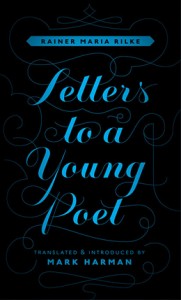My quarrel with Rilke
Sunday, November 6th, 2011 Rainer Maria Rilke‘s advice to an aspiring young writer took the form of a series of letters from 1902 to 1908. Letters to a Young Poet has been translated again for Harvard University Press by Mark Harman, who has translated Franz Kafka to much praise. (A podcast is here.)
Rainer Maria Rilke‘s advice to an aspiring young writer took the form of a series of letters from 1902 to 1908. Letters to a Young Poet has been translated again for Harvard University Press by Mark Harman, who has translated Franz Kafka to much praise. (A podcast is here.)
The Prague-born poet wrote in German, a little in French. Here’s what Harmon wrote in his introduction:
He also prized the differing personality, as it were, of each language: Two years later in a letter to Lou Andreas-Salomé he notes that on the few occasions when he wrote about the same subject in French and in German it “developed very differently in the two languages: which argues strongly against the naturalness of translation.”
The Harvard University Press’ blog cites one of the most famous passages from the letters:
You ask whether your verses are good. You ask me. You have already asked others. You send them to journals. You compare them with other poems, and are upset when certain editorial offices reject your efforts. Now (since you’ve permitted me to give you advice) I ask you to abandon all this. You look outside yourself, and that above all else is something you should not do just now. Nobody can advise you and help you, nobody. There’s only one way to proceed. Go inside yourself. Explore the reason that compels you to write; test whether it stretches its roots into the deepest part of your heart, admit to yourself whether you would have to die if the opportunity to write were withheld from you. Above all else, ask yourself at your most silent hour of night: must I write? Dig inside yourself for a deep answer. And if the answer is yes, if it is possible for you to respond to this serious question with a strong and simple I must, then build your life on the basis of this necessity; your life, even at its most indifferent and attenuated, must become a sign and a witness for this compulsion.
 It all sounds very grand, of course. But I wonder how many young writers are prepared to make that decision – who could find “the deepest part” of their hearts even with a GPS. In my experience, many of them think they must write – it’s a compulsive part of youth. They think they “would have to die if the opportunity to write were withheld.”
It all sounds very grand, of course. But I wonder how many young writers are prepared to make that decision – who could find “the deepest part” of their hearts even with a GPS. In my experience, many of them think they must write – it’s a compulsive part of youth. They think they “would have to die if the opportunity to write were withheld.”
But somehow they manage, as the years go on. For most, the question shifts when balanced against the needs of a household, or when the old Camry breaks down, or when the medical bills pile up. Of course, it also shifts as the rejection letters mount, and you find that the guidance from your own sweet self isn’t as reliable as the jalopy’s GPS. Usually, the writing compulsion leads to others – and who is to say they’re not equally valid?
It’s only when you’re older, more seasoned, and look back over your life and your choices, and realize that, for better or worse, writing is what you did.


